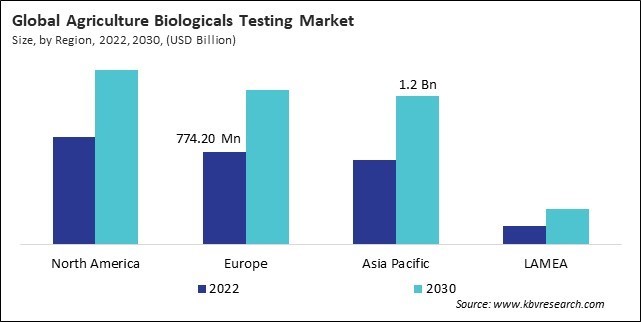According to a new report, published by KBV research, The Global Agriculture Biologicals Testing Market size is expected to reach $4.3 billion by 2030, rising at a market growth of 6.9% CAGR during the forecast period.
Agriculture biologicals testing evaluates the coexistence and synergies between biological and conventional farming inputs. Some biopesticides and biostimulants enhance the plant’s natural defense mechanisms against diseases. Agriculture biologicals testing assesses the effectiveness of these products in conferring disease resistance, contributing to sustainable disease management practices in agriculture. Continuous advancements in technology are reshaping the landscape of agriculture biologicals testing.

Molecular biology techniques, high-throughput screening, and other cutting-edge technologies are being integrated into testing protocols, enhancing the accuracy and efficiency of assessments. This trend not only improves the precision of testing but also allows for a more comprehensive understanding of the biological inputs. Bioinformatics is gaining prominence in agriculture biologicals testing. This involves the application of computational tools and techniques to analyze biological data, facilitating a deeper understanding of the interactions between biological inputs and crops.
Increasing consumer awareness of the benefits of biological inputs is influencing product labeling trends. Companies emphasize using agriculture biologicals testing to verify and communicate their products’ safety, quality, and efficacy. Transparent and informative product labeling helps build trust among consumers and encourages the adoption of biological solutions. The sustainability aspect extends to testing practices themselves. An increasing focus is being placed on implementing sustainable testing methodologies, which encompass energy-efficient testing processes, eco-friendly packaging, and reduced resource consumption.
The Biological Product Manufacturers segment is generating highest revenue in the Global Agriculture Biologicals Testing Market, by End-User in 2022; thereby, achieving a market value of $1.8 Billion by 2030. Biological product manufacturers develop biofertilizers containing beneficial microorganisms, such as nitrogen-fixing bacteria or mycorrhizal fungi. These biofertilizers enhance soil fertility, nutrient availability, and plant growth. Testing ensures that biofertilizers effectively contribute to soil health and nutrient management. Agricultural biologicals include biological control agents such as beneficial insects, nematodes, and microorganisms that help suppress plant diseases.
The Biofertilizers segment is experiencing a CAGR of 7.3% during (2023 - 2030). Biofertilizers, containing beneficial microorganisms such as nitrogen-fixing bacteria, phosphate-solubilizing bacteria, and mycorrhizal fungi, improve soil health and fertility. They facilitate nutrient cycling, increase plant availability, and enhance soil structure. Agriculture biologicals testing verifies the effectiveness of these microorganisms, ensuring they positively influence soil properties. Natural and biologically derived biofertilizers contribute to reduced chemical residue accumulation in the soil.
Full Report: https://www.kbvresearch.com/agriculture-biologicals-testing-market/
The North America region dominated the Global Agriculture Biologicals Testing Market, by Region in 2022, and would continue to be a dominant market till 2030; thereby, achieving a market value of $1.5 Billion by 2030. The Europe region is anticipated to grow at a CAGR of 6.8% during (2023 - 2030). Additionally, The Asia Pacific region would witness a CAGR of 7.5% during (2023 - 2030).
By End-User
By Product Type
By Geography
 Unique Offerings
Unique Offerings